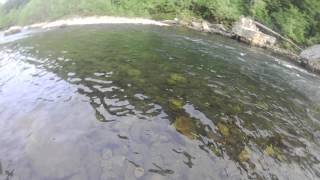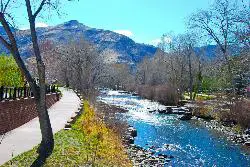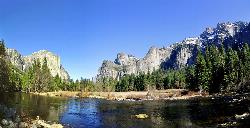Whitewater
"Thrills and spills await on the wild and wavy rapids of whitewater rafting and kayaking! Are you ready to brave the currents and conquer the waves? Read on to learn more about this exciting outdoor adventure."
Whitewater rafting and kayaking are both popular water sports that take place on rivers with varying degrees of roughness, or "whitewater." These activities offer a thrilling and physically demanding way to explore the great outdoors and test your limits.
Rafting involves navigating through whitewater rapids in an inflatable raft with a group of people, often guided by a trained and experienced rafting guide. Rafters use paddles to steer the raft and work together to navigate through the rough waters.
Kayaking, on the other hand, involves navigating through the rapids in a small, one or two-person kayak, using a double-bladed paddle to steer and propel the craft. Kayakers may choose to go solo or join a guided group.
Both rafting and kayaking offer a unique and exciting way to experience nature, with the added adrenaline rush of tackling challenging rapids. For some, it's a chance to challenge themselves and try something new and exciting. Others enjoy the opportunity to bond with friends and family, or to appreciate the natural beauty of their surroundings in a unique way.
If you're interested in giving whitewater rafting or kayaking a try, it's important to choose a reputable outfitter and follow safety guidelines. Proper training and safety equipment, such as helmets and life jacket, are crucial for a safe and enjoyable trip.
So if you're ready to brave the currents and conquer the waves, grab your paddle and join the adventure of a lifetime with whitewater rafting and kayaking!
Here's some of our favorite whitewater rapids

Cossatot River Falls
Duckett, Arkansas
1.6 miles N of Duckett, ArkansasCassatot River Falls is a stunning location for a variety of adventures. With its fast moving blue water and stunning dark rock formations the views available for visitors are a gorgeous backdrop for...
Camp, Hike, Swim, Whitewater
River Access Hole
Cabins, West Virginia
2.2 miles SW of Cabins, West VirginiaRiver Access Hole is a spot on the North Fork of the South Branch of the Potomac River. This scenic forested area has beautiful rock formations and running water, creating breathtaking peaceful views...
Canoe, Kayak, Swim, Whitewater
Shoe Creek
Roseland, Virginia
6.8 miles NW of Roseland, VirginiaShoe Creek is the perfect place for thrill seekers who love to experience the outdoors. Shoe Creek Trail is a high adventure off-roading. Vehicles hoping to explore this trail should be high...
WhitewaterBullpasture Gorge
Williamsville, Virginia
1.7 miles NW of Williamsville, VirginiaBullpasture Gorge is a beautiful river gorge with 3 miles of accessible white water rapids. These rapids are popular for kayakers and rafters alike.
Canoe, Hike, Kayak, Whitewater
Pine Flat Hot Springs
Garden Valley, Idaho
13.5 miles E of Garden Valley, IdahoPine Flat Hot Springs is a popular soaking location near the Pine Flat Campgrounds. On the edge of the South Fork Payette River there are several hot springs moving up thee bank. The most popular of...
Camp, Canoe, Hike, Hot Springs, Kayak, Whitewater 0.1-0.9 mi
Clear Creek Whitewater Park
Golden, Colorado
0.3 miles W of Golden, ColoradoDedicated in 1998 and located in Golden, Colorado, Clear Creek Park is one of the most unique parks in Colorado filled with water activities such as kayaking and canoeing. It reaches a quarter...
Canoe, Hike, Kayak, Mountain Bike, Swim, Whitewater
Baby Falls
Tellico Plains, Tennessee
7.1 miles E of Tellico Plains, TennesseeThe Tellico River is the home of the Baby Falls waterfall/swimming hole. Although it is beautiful at all times of the year, fall has been said to be one of the most beautiful and favorite times for...
Hike, Kayak, Swim, Whitewater 3.8 mi
Ramsey Cascades
Gatlinburg, Tennessee
8.6 miles E of Gatlinburg, TennesseeHike, Kayak, Swim, and Whitewater near Gatlinburg, Tennessee
Hike, Kayak, Swim, Whitewater
Merced River
Yosemite Valley, Yosemite National Park
0.6 miles SE of Yosemite Valley, Yosemite National ParkThe main fork of Merced River at Yosemite National Park is a perfect place to fish, swim, raft, and even pan for gold. The river circles around the center of Yosemite Valley, and almost every...
Camp, Swim, Whitewater
Auburn Area
San Francisco, California
2.2 miles N of San Francisco, CaliforniaAlongside of the North Fork of the American River in the Auburn State Recreation Area, there are several swimming holes. Located at Emigrant Gap in the Tahoe National Forest, the North...
Hike, Horseback, Kayak, Rock Climb, Swim, Whitewater- Plan Ahead and Prepare. Know the regulations and special concerns for the area you'll visit. Prepare for extreme weather, hazards, and emergencies. Schedule your trip to avoid times of high use. Visit in small groups when possible. Consider splitting larger groups into smaller groups. Repackage food to minimize waste. Use a map and compass to eliminate the use of marking paint, rock cairns or flagging.
- Travel & camp on durable surfaces. Durable surfaces include established trails and campsites, rock, gravel, dry grasses or snow. Protect riparian areas by camping at least 200 feet from lakes and streams. Good campsites are found, not made. Altering a site is not necessary.
- Dispose of waste properly. Pack it in, pack it out. Inspect your campsite and rest areas for trash or spilled foods. Pack out all trash, leftover food and litter. Deposit solid human waste in catholes dug 6 to 8 inches deep, at least 200 feet from water, camp and trails. Cover and disguise the cathole when finished. Pack out toilet paper and hygiene products. To wash yourself or your dishes, carry water 200 feet away from streams or lakes and use small amounts of biodegradable soap. Scatter strained dishwater.
- Leave what you find. Preserve the past: examine, but do not touch cultural or historic structures and artifacts. Leave rocks, plants and other natural objects as you find them. Avoid introducing or transporting non-native species. Do not build structures, furniture, or dig trenches.
- Minimize campfire impacts. Campfires can cause lasting impacts to the environment. Use a lightweight stove for cooking and enjoy a candle lantern for light. Where fires are permitted, use established fire rings, fire pans, or mound fires. Keep fires small. Only use sticks from the ground that can be broken by hand. Burn all wood and coals to ash, put out campfires completely, then scatter cool ashes.
- Respect wildlife. Observe wildlife from a distance. Do not follow or approach them. Never feed animals. Feeding wildlife damages their health, alters natural behaviors, and exposes them to predators and other dangers. Protect wildlife and your food by storing rations and trash securely. Control pets at all times, or leave them at home. Avoid wildlife during sensitive times: mating, nesting, raising young, or winter.
- Be considerate of other visitors. Respect other visitors and protect the quality of their experience. Be courteous. Yield to other users on the trail. Step to the downhill side of the trail when encountering pack stock. Take breaks and camp away from trails and other visitors. Let nature's sounds prevail. Avoid loud voices and noises.

















